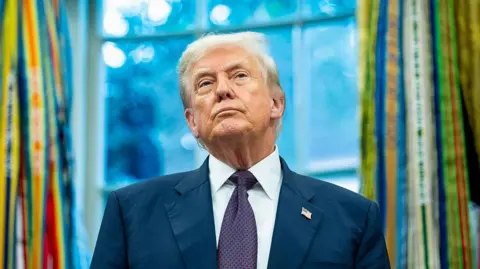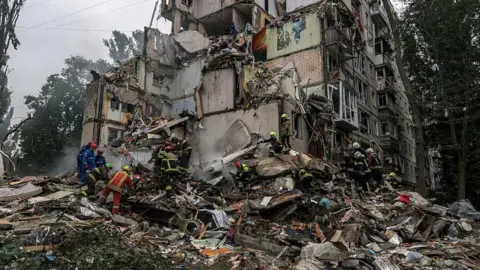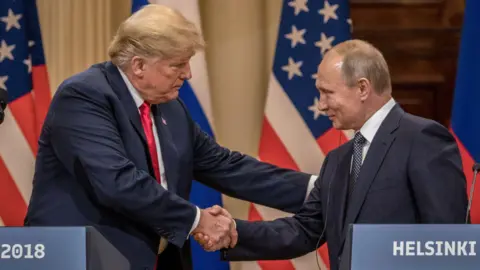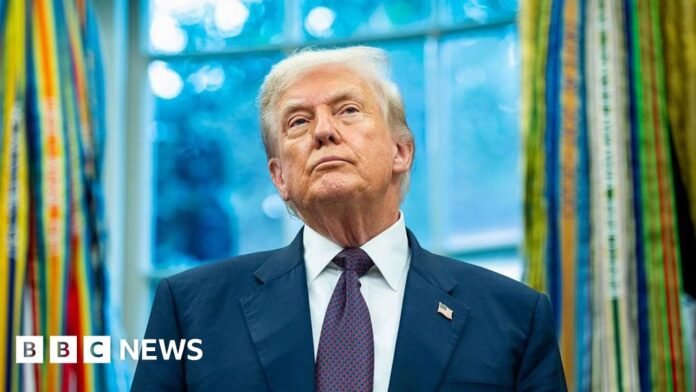BBC Monitoring Russia editor
 Getty Images
Getty ImagesThe war in Ukraine, sparked by Russia’s full-scale invasion in February 2022, has cost both Moscow and Kyiv tens of thousands of civilian lives.
In the east of Ukraine, Russia presses on in a grinding and bloody advance. Deadly aerial strikes are a nightly occurrence across the country, while Russia’s refineries and energy facilities come under regular attack from Kyiv’s drones. The fighting shows no sign of abating.
It is against this backdrop that the Kremlin confirmed a meeting between Donald Trump and Vladimir Putin was being planned and due to take place soon. “I’m here to get [the war] over with,” the US leader said on Wednesday.
Three rounds of talks between Russia and Ukraine held at his behest between May and July have failed to bring the two sides any closer to peace, and Trump may hope that taking the situation into his own hands could finally result in a ceasefire.
But the gulf between Kyiv and Moscow is so large that even Trump-mediated talks could make it difficult to bridge.
In a memorandum presented to the Ukrainians by Russia in June, Moscow outlined its maximalist demands for a “final settlement” of the conflict. They include the recognition of Russian sovereignty over the Ukrainian regions of Crimea, Donetsk, Luhansk, Zaporizhzhia and Kherson as well as Ukraine agreeing to demilitarisation, neutrality, no foreign military involvement and new elections.
 Getty Images
Getty Images“The Russian side can frame this in a dozen different ways, creating the impression that Moscow is open to concessions and serious negotiation,” wrote Russian political analyst Tatiana Stanovaya. “But the core position remains unchanged: Russia wants Kyiv to surrender.”
Following a meeting between Putin and US envoy Steve Witkoff, US Secretary of State Marco Rubio said on Wednesday that Washington had a better understanding of the conditions under which Russia would be prepared to end the war.
We don’t know if those conditions have changed. However, only last week Putin – likely referencing the memorandum – said Russia had made its goals known in June, and that those goals had stayed the same.
Therefore, despite the Kremlin agreeing to a Trump-Putin meeting, there is no reason to believe Moscow is ready to budge on its tough preconditions.
So why would Putin be agreeing to talks at this stage?
One possibility is that it hopes engaging in dialogue could fend off the secondary sanctions Trump has threatened to impose on Moscow’s trading partners as soon as Friday. The Kremlin may also feel it could convince Trump of the merits of its conditions to end the war.
 Getty Images
Getty ImagesAt the start of his second term in office, Trump appeared to be more aligned with Russia than Ukraine, labelling Zelensky a “dictator” and suggesting he was to blame for the war with Russia.
Although he has since signalled his impatience with Putin – “he’s just tapping me along”, he said in April – Trump has also refused to say whether he felt the Russian leader had been lying to him over his readiness to move towards a ceasefire.
Whether because of personal affinity or an aligned worldview, Trump has been reluctant to ever fully condemn Putin for his actions.
When the two met in Helsinki in 2018 – during Trump’s first term as president – many were left stunned to see Trump side with the Kremlin over accusations of Russian meddling in the 2016 US election and take responsibility for the tense state of US-Russia relations.
It is perhaps partly to fend off the possibility of Trump being swayed by Putin that Kyiv wants to be involved in any ceasefire talks.
Through his envoy, Trump has also suggested holding a trilateral with Putin and Zelensky. But the Kremlin has batted off these suggestions, making it clear it sees no reason for Putin and Zelensky to meet until the two delegations have reached “specific agreements”.
Now some in Ukraine are concerned a Trump-Putin meeting may result in the US president giving in to Putin’s demands.
Ukrainian MP Iryna Herashchenko said it was becoming evident that demands for territorial concessions by Ukraine would be made and added being absent from the negotiating table would be “very dangerous” for Kyiv.
“Ukraine is not afraid of meetings and expects the same bold approach from the Russian side,” Zelensky said on Thursday.
But the gulf between Russia and Ukraine remains.
And should the Kremlin eventually agree to a trilateral meeting, Moscow’s demands for a ceasefire have proven so intractable that it is unclear what bringing Zelensky and Putin face-to-face might achieve.





